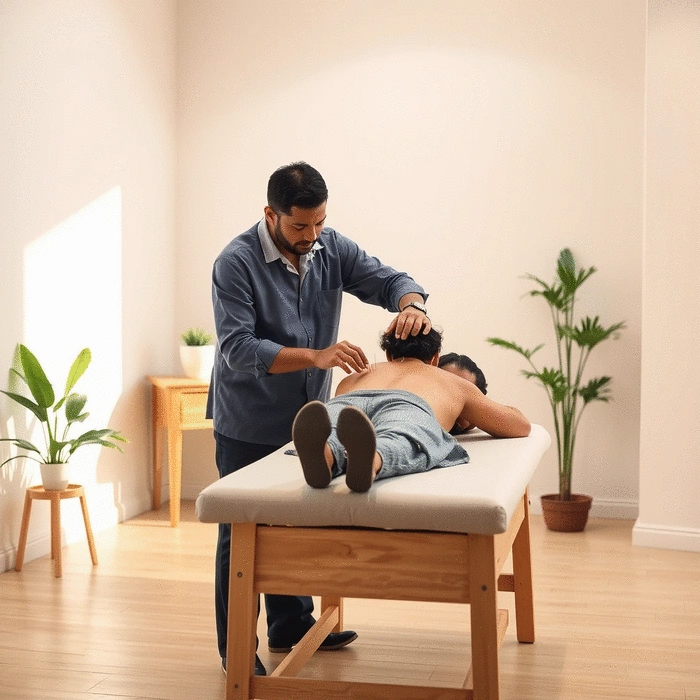Chinese Acupuncture
Traditional approach focusing on Qi balance and energy flow.
Subscribe to get the latest insights and updates straight to your inbox.
Posted on: 2025-08-23
By: Kaiya Whitmore
Acupuncture is not just a method of pain relief; it's a rich tapestry of cultural history and practices that varies significantly across the globe. As this ancient technique gains popularity in modern wellness programs, understanding its diverse applications can enhance its effectiveness and deepen patient engagement.
Exploring the various approaches to acupuncture across different cultures highlights its diverse applications and techniques. To learn more about how these practices are viewed globally, read about cultural perspectives on acupuncture practices.
Traditional approach focusing on Qi balance and energy flow.
Utilizes gentler techniques, emphasizing patient comfort and relaxation.
Incorporates unique points and styles, showcasing local adaptations.
In clinical settings, often used as part of integrative medicine.
Acupuncture is a fascinating practice that transcends borders and cultures, offering a glimpse into the holistic approaches to health worldwide. At its core, acupuncture involves inserting thin needles into specific points on the body, a technique that has been passed down through generations. This ancient method is not merely about pain relief; it embodies a rich history and philosophy that varies across different cultures, shaping how people view health and wellness.
Throughout history, acupuncture has been significant in traditional Chinese medicine, believed to balance the body's energy, known as Qi. This historical significance is echoed in various cultures that have adapted and integrated acupuncture into their unique health practices. For example, while the origins of acupuncture lie in China, countries like Japan and Korea have developed their own techniques and philosophies, further enriching the practice.
When we think of acupuncture, it’s essential to recognize its roots in ancient traditions. Acupuncture's history dates back thousands of years, with early references found in Chinese texts from around 100 BCE. This rich heritage underscores its value as a culturally significant healing art, enhancing the understanding of this practice beyond its physical applications.
Moreover, acupuncture has evolved as a response to changing societal health needs. For instance, in Japan, the focus is often on gentle techniques that prioritize comfort and relaxation. This cultural adaptation illustrates how acupuncture is not a one-size-fits-all solution, but rather a tailored approach that resonates deeply with the individual cultural context. For more insights on the benefits of acupuncture, explore insights on acupuncture benefits.
Across the globe, acupuncture has found its way into various healthcare systems, showcasing its versatility and appeal. In the United States and Europe, it’s often integrated into wellness programs as a complementary therapy. Many people are turning to acupuncture for stress relief and pain management, proving its relevance in contemporary health conversations.
Interestingly, the acceptance of acupuncture varies widely across cultures. While some embrace it wholeheartedly, others are more skeptical. This disparity can be attributed to differences in cultural beliefs and healthcare systems, leading to unique practices and experiences. Here are a few notable global practices:
As we explore the role of acupuncture in modern medicine, it’s clear that it serves as a bridge between traditional practices and contemporary health solutions. Integrative medicine utilizes acupuncture alongside conventional treatments, creating a holistic approach that caters to the whole person. This blend is gaining traction as people seek more comprehensive health solutions. To understand more about how acupuncture fits into modern medical systems, consider reading about acupuncture in global healthcare systems.
At Acupuncture Perspectives, we believe that understanding how various cultures view acupuncture is crucial for practitioners and patients alike. This awareness fosters a respectful and effective practice that honors traditional wisdom while embracing modern advancements. When acupuncture is integrated thoughtfully, it can enhance patient experiences and outcomes, making it a valuable tool in any healthcare setting.
Here's a brief recap of the key points discussed so far:
As we explore the diverse practices of acupuncture, it becomes clear that culture plays a pivotal role in shaping its application and effectiveness. Each region's unique history and beliefs influence how acupuncture is perceived and utilized, highlighting the importance of understanding these cultural contexts. For instance, while acupuncture is often seen as a pain relief method in the West, many Eastern cultures view it as a pathway to overall balance and wellness.
In reflecting on the data gathered, it's essential to recognize the role of cultural sensitivity in acupuncture practice. When practitioners, like those at Acupuncture Perspectives, are aware of their patients' backgrounds, they can tailor their approaches to resonate more deeply with individual experiences. This not only enhances treatment efficacy but also fosters a trusting relationship that is critical for healing.
Cultural sensitivity is more than just a buzzword; it’s a vital component of effective acupuncture treatment. Understanding a patient's cultural background can lead to better communication and treatment outcomes. Here are some key factors that underscore the importance of cultural sensitivity:
By being mindful of these elements, practitioners can create more impactful experiences for their patients, leading to a deeper appreciation for acupuncture's benefits.
The insights gained from studying acupuncture across cultures open doors for future research and clinical applications. As we dive deeper into understanding how different backgrounds influence treatment outcomes, we can identify areas where acupuncture may thrive or need adjustment. Some implications for future research include:
As I continue to share my journey through Acupuncture Perspectives, I’m excited about the potential these research avenues hold to further validate and enhance the practice of acupuncture globally. For further expert insights, consider exploring insights from acupuncture specialists.
Incorporating acupuncture into holistic health and wellness programs can create a more comprehensive approach to patient care. By recognizing the interplay between physical, emotional, and spiritual health, we can truly embrace what holistic wellness means. Here are some elements to consider when integrating acupuncture into wellness programs:
Through these integrated programs, we can empower individuals to take charge of their health journeys, embracing the profound healing potential of acupuncture and holistic practices.
Engagement is key when it comes to exploring acupuncture and its benefits. For those curious about diving into this ancient practice, understanding what to expect can demystify the process and encourage broader participation. I invite you to explore this journey with an open mind!
One of the most common inquiries I receive is about the effectiveness of acupuncture. Many studies suggest that cultural context significantly impacts outcomes, so it’s essential to approach this treatment with openness and a willingness to explore its unique benefits.
When seeking an acupuncturist, look for practitioners who demonstrate cultural competence. Here are some tips:
Finding the right practitioner can make a world of difference in your acupuncture experience! To learn more about understanding acupuncture and traditional Chinese medicine, visit understanding acupuncture and Chinese medicine.
As we wrap up this exploration, it’s crucial to encourage a broader understanding of acupuncture and its diverse applications. Engaging with this practice can lead to profound personal health transformations. I invite everyone to share their own experiences with acupuncture, as these stories can inspire others and foster a sense of community.
Sharing your acupuncture journey not only enriches your own understanding but also helps build a supportive network. Whether it’s a success story or a lesson learned, your insights can resonate with others seeking healing through this ancient practice.
There’s a wealth of resources available for those wanting to learn more about acupuncture. I encourage you to explore articles, join community workshops, or connect with practitioners to deepen your knowledge. At Acupuncture Perspectives, we strive to provide the tools and information that empower you on your journey toward holistic wellness!
Here is a quick recap of the important points discussed in the article:

 Acupuncture's journey from ancient practice to modern healthcare staple is a fascinating tale of evo
Acupuncture's journey from ancient practice to modern healthcare staple is a fascinating tale of evo
 In a world where holistic health practices are gaining traction, understanding how to evaluate treat
In a world where holistic health practices are gaining traction, understanding how to evaluate treat
 In the ever-evolving world of healthcare, acupuncture is carving out a significant niche in chronic
In the ever-evolving world of healthcare, acupuncture is carving out a significant niche in chronic